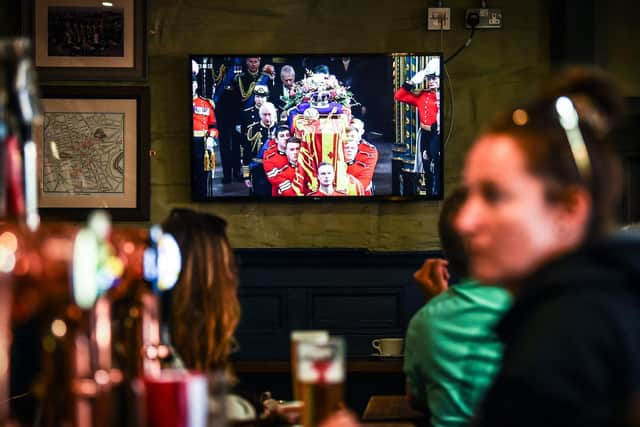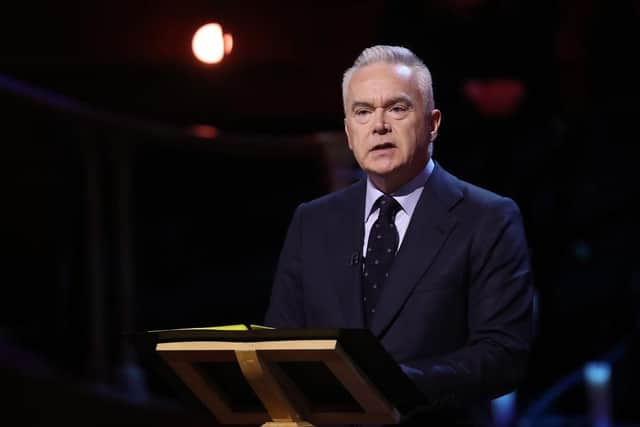Queen's funeral on TV: "Honestly, you will be blown away," said Huw, and he was right
The BBC, the public service broadcaster but presumably not wholly bound by every dotted and crossed decree of Operation London Bridge, decided to go for long and a gargantuan nine hours of uninterrupted coverage and could only hope it would not be boring.
Huw Edwards opened proceedings on his own, high up behind glass overlooking Westminster Abbey, in his now familiar black tie but with his voice altered for the day, a quieter register, with slower and softer tones than he’d normally use for the nightly grimness of the ten o’clock news.
Advertisement
Hide AdAdvertisement
Hide AdAnd just as the edges came off his Welsh burr so they did Fergal Keane’s Irish brogue and indeed for the first of the latter’s dispatches from inside the Abbey he was so hushed that the volume button required cranking up.


Edwards may have been caught on the hop by the Queen’s death - his phone was stolen the night before, rendering him incommunicado at the barber’s until his son rushed through the message: “Go to work immediately” - but had risen to the occasion during ten days of mourning. The big test, though, was still to come.
Though he promised “unrivalled” coverage, the Beeb’s first hour was tentative, with an unfortunate habit of cutting from Edwards’ eyrie when guests were in mid-flow to roam key locations manned by the rest of the broadcast big dogs.
One such interlude had Sophie Raworth having to listen to the founder of a diversity charity plugging her organisation. Raworth tried to turn the conversation back to the real reason for the voxpop. And what was it like meeting the Queen? “Oh, that moment encapsulated everything I stand for,” came the unabashed reply.
Then next time Edwards looked in on Raworth she was with representatives of another charity, one of whom quipped flirtily: “Good luck in the marathon.” With well-practised rictus grin, as per the BBC handbook for state-occasion blips, the presenter said nothing.


Back in the studio the ever-changing guests offered up their anecdotes about the Queen as pantomime’s principal boy, her dislike for Victorian architecture and the conspiratorial thrill of learning the wartime hiding place for the Crown Jewels - inside a box of Bath Olivers. The best yarn actually concerned the Princess Royal who, when learning of the top secret plan for “Mama” and James Bond’s helicopter leap into the opening ceremony for the 2012 Olympics, snorted: “You’ll never get a Chinook under Tower Bridge. It has to be a Sea King, a twin-engined one.”
Not long now, so Edwards explained the proceedings and one in particular: the glorious racket we could expect from the massed pipes and drums of the Scottish and Irish regiments: “A spectacular sight and sound … Hugely impressive and hugely moving.” Huw was possibly turning into Huwgely and getting carried away, deviating from the handbook. “Intense and powerful,” he continued. “Just wait for the procession - honestly, you will be blown away by it.”
But he was right, it was all of that. And then the talking - everywhere, for other networks were available yesterday - stopped. Were we disappointed the Abbey cameras didn’t alight on more faces? Maybe, so we had to make do with Chief Medical Officer Chris Whitty, Graham Brady, chairman of the Convervatives’ 1922 Committee and a few others, at least until the ex-PMs shuffled into their pews.
Advertisement
Hide AdAdvertisement
Hide AdWho dropped the piece of paper? Just up the steps from King Charles? And was too terrified to retrieve it? Even from the roof it could be seen. The great-grandchildren probably had a little snigger about that, and maybe the Queen herself would have been amused.
Flicking the channels, Keane was first to resume commentary but Sky was first with thoughts and reflections from one of the 2,000 Abbey mourners - Peaches Golding, the UK’s first black female Lord Lieutenant. As the Queen left London for the last time, ITV’s Tom Bradby instigated keen debate about Britain’s “fractious” relationship with other countries - including much of Europe and China whose vice-president controversially attended the funeral - until someone remembered EU chief Ursula von der Leyen’s quote about the late monarch being “the soul of the whole world”. And then the BBC wheeled in their queen. Kirsty Young, installed at Windsor, had the benefit of the funeral having happened and was aided and abetted for the last leg of the Queen’s journey by David Dimbleby on magisterial form completing a circle, with the latter’s father Richard having voiced the 1953 coronation for the Beeb.
Poor Edwards, according to Twitter wags, has been “awake for almost two weeks straight”. An heroic shift, but in the morning he’d been required to “fill” some more and there had been nervous anticipation. Young, though, has that honeyed, hypnotic voice which could draw damning confessions from guilty men. Alan Titchmarsh is not a guilty man but he freely told Young what the Queen said when awarding him the MBE (“You’ve made a lot of women very happy”) and how, at Dumfries House, he’d bid the King goodnight in his last hours as the Prince of Wales.
Historian David Cannadine used the word “de-imperialisation”. “That’s a good one,” said Young. “I’ll give you another - de-victorianisation.” Young put her subjects completely at ease - and her bogglingly huge TV audience.
Dimbleby, in his recent series Days That Shook the BBC, argued the Corporation is more scared of Buckingham Palace than it is of Downing Street. “How many programmes have there been about the cost of the monarchy,” he asked, “or whether the Queen is doing a good job?”
I don’t think there’s anything to fear about yesterday’s coverage. A good job.
Comments
Want to join the conversation? Please or to comment on this article.